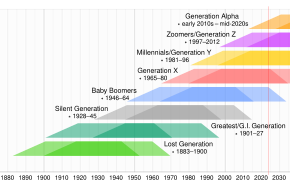
Back جيل ضائع Arabic İtirilmiş nəsil Azerbaijani Nawawarang Henerasyon BCL Страчанае пакаленне Byelorussian Страчанае пакаленьне BE-X-OLD Изгубено поколение Bulgarian Generació perduda Catalan Ztracená generace Czech Lost Generation German Perdita generacio Esperanto
| Part of a series on |
| Social generations of the Western world |
|---|
 |
The Lost Generation is the demographic cohort that reached early adulthood during World War I, and preceded the Greatest Generation. The social generation is generally defined as people born from 1883 to 1900, coming of age in either the 1900s or the 1910s, and were the first generation to mature in the 20th century. The term is also particularly used to refer to a group of American expatriate writers living in Paris during the 1920s.[1][2][3] Gertrude Stein is credited with coining the term, and it was subsequently popularised by Ernest Hemingway, who used it in the epigraph for his 1926 novel The Sun Also Rises: "You are all a lost generation."[4][5] "Lost" in this context refers to the "disoriented, wandering, directionless" spirit of many of the war's survivors in the early postwar period.[6]
In the wake of the Industrial Revolution, Western members of the Lost Generation grew up in societies that were more literate, consumerist, and media-saturated than ever before, but which also tended to maintain strictly conservative social values. Young men of the cohort were mobilized on a mass scale for World War I, a conflict that was often seen as the defining moment of their age group's lifespan. Young women also contributed to and were affected by the war, and in its aftermath gained greater freedoms politically and in other areas of life. The Lost Generation was also heavily vulnerable to the Spanish flu pandemic and became the driving force behind many cultural changes, particularly in major cities during what became known as the Roaring Twenties.
Later in their midlife, they experienced the economic effects of the Great Depression and often saw their own sons leave for the battlefields of World War II. In the developed world, they tended to reach retirement and average life expectancy during the decades after the conflict, but some significantly outlived the norm. The last surviving person who was known to have been born during the 19th century was Nabi Tajima, who died in 2018 at age 117, while the last man born during the 19th century was Jiroemon Kimura, who died in 2013 at age 116. Most members were parents of the Greatest Generation and Silent Generation.
- ^ Madsen, Alex (2015). Sonia Delaunay: Artist of the Lost Generation. Open Road Distribution. ISBN 978-1-5040-0851-8.
- ^ Fitch, Noel Riley (1983). Sylvia Beach and the Lost Generation: A History of Literary Paris in the Twenties and Thirties. WW Norton. ISBN 978-0-393-30231-8.
- ^ Monk, Craig (2010). Writing the Lost Generation: Expatriate Autobiography and American Modernism. University of Iowa Press. ISBN 978-1-58729-743-4.
- ^ Hemingway, Ernest (1996). The Sun Also Rises. New York: Scribner. ISBN 978-0-684-83051-3. OCLC 34476446.
- ^ Monk, Craig (2010). Writing the Lost Generation: Expatriate Autobiography and American Modernism. Iowa City, IA: University of Iowa Press. p. 1. ISBN 978-1-58729-743-4. Archived from the original on 4 August 2021. Retrieved 6 January 2020.
- ^ Hynes, Samuel (1990). A War Imagined: The First World War and English Culture. London: The Bodley Head. p. 386. ISBN 978-0-370-30451-9.